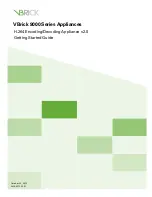
Lisa Compact
48
12
Task scheduling
Lisa devices are autonomous until a certain degree, they support reconnects, fallback etc. However,
some operations require dynamic (inter)action. For instance powering the device on/off, updating the
content on the card, etc.
This is the role of the Task Scheduler. The Task Scheduler is a process running in the background
which is always checking if any ‘tasks’ need to be performed. These time-stamped tasks are
downloaded from a remote server, in the form of a schedule file.
Two things are required for the Task Scheduler:
·
A schedule file, which contains a list of tasks (max. 50 tasks). This is a collection of time-stamped
tasks, which the Lisa has to perform.
·
The correct time 'on the clock', so that the Lisa knows when to perform the tasks.
By default the Lisa will retrieve its schedule file from the Device portal, if enabled there. The Lisa can
also be programmed to retrieve the schedule from Streamit Streamit Audio Distribution Platform (ADP),
or a custom-built platform. A task can be defined on the selected platform, see the manual for that
platform for details. Finally, the Lisa can also read its schedule from the SD card.
The time and date of the clock of the Lisa is set by a special tasks in the schedule file (the Streamit
Device portal and Streamit ADP include this task in all schedules).
Schedule update
The task schedule may require changes from time to time. Therefore, the task schedule can be updated
by restarting the Lisa (during startup the schedule is updated) or by executing a schedule update task.
This task can be part of the schedule itself, so that it regularly updates itself, or the schedule update task
can be requested via one of the methods available to send commands to the Lisa (see
).
12.1
Tasks and interruptions
The only responsibility of the Task Scheduler is to start certain tasks at the required moment in time
When it is time for the next scheduled task, the Task Scheduler will in principle interrupt the on-going
process and initiate the next scheduled task, no matter if the on-going process was initiated from the
Task Scheduler or the user. The other way around is also true: When the device is busy with tasks
initiated from the Task Scheduler, the user is able to interrupt these tasks with user actions.
As mentioned, tasks will interrupt the on-going process. There are three main exceptions to this:
·
If the Lisa plays an announcement, no other task will interrupt the playback of the announcement. In
some cases the other task will be rescheduled (see
Handling task execution failure
). A commercial will
not be rescheduled. Instead, the commercial will be played immediately after the announcement and
before the playback of the playlist resumes.
·
If the Lisa performs a schedule update, all other tasks will be postponed until the schedule update task
is completed.
















































